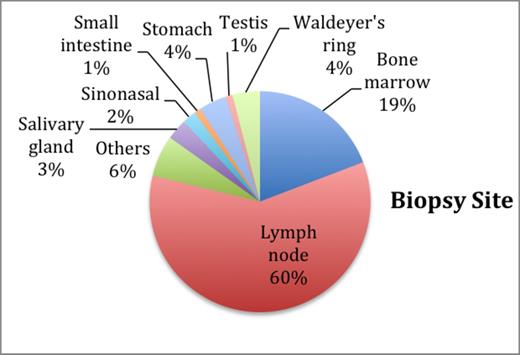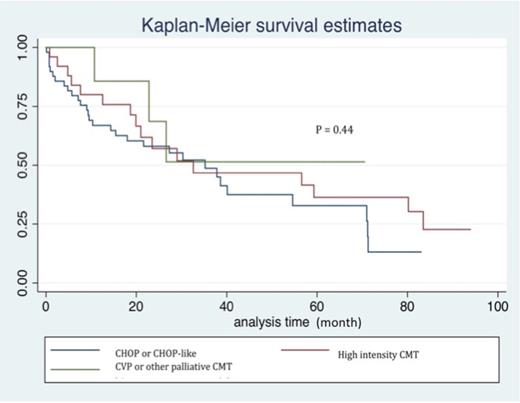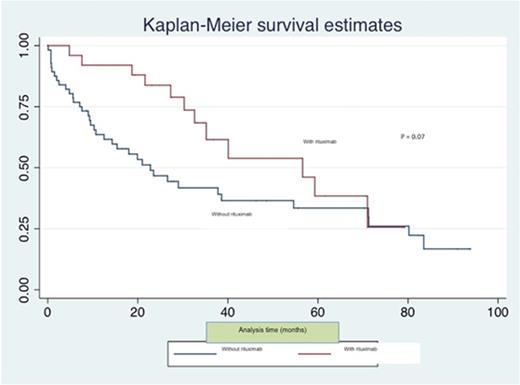Abstract
Introduction: Mantle cell lymphoma (MCL) is a relatively rare and aggressive mature B-cell non-Hodgkin lymphoma (NHL) entity, encounting for 3-10% of newly diagnosed patients. The purpose of the study is to analyse the incidence, clinical features and outcomes of Thai patients with MCL and compare data with those of Western countries.
Patients and methods: From the nationwide multicenter registry of 4,056 newly diagnosed NHL patients in Thailand between 2007-2014, patients with MCL were identified according to the criteria of diagnosis by WHO classification of lymphoid disorders, 2008. The incidence, baseline clinical characteristics and outcomes were then analysed.
Results: Ninety-nine patients (2.4%) were found to have MCL. The median age was 59.8 years (range 33-86). Seventy-nine percent of patients were men. The primary sites of disease were lymph nodes (60%), bone marrow (19%), GI tract (9%), Waldeyer's ring (4%), sinonasal area (2%) and miscellaneous (6%). (Figure 1). Eighty-three percent of the patients had stage III/IV. Eighty-one patients (82%) received chemotherapy (60.5% with CHOP or CHOP-like chemotherapy, 30.9% with HyperCVAD, and 26% with rituximab-based). Other received palliative chemotherapy or did not receive any. At a median follow-up time of 42 months, the median survival was 30 months (range, 1-94 months). By using Cox analysis, only Ann Arbor stage had impact on overall survival.
Conclusion: MCL is less frequent in Thailand compare to the Western countries. The long-term survival is also much inferior reflecting the limited access to rituximab as well as the high intensity therapy in treating MCL in Thailand.
Comparison of MCL patients according to treatment modalities
| Clinical characteristics (Total 81 cases) . | CHOP-like (n=49 ) . | High intensity CMT (n = 25 ) . | CVP or palliative CMT (n = 7 ) . | p-value . |
|---|---|---|---|---|
| No R | 33 | 19 | 4 | - |
| Age > 60 | 19 (67%) | 6 (24%) | 5 (71%) | - |
| Stage III-IV | 42 (85.7%) | 21 (84%) | 7 (100%) | - |
| Response Overall response Complete response | 26 (53.1%) 19 (38.8%) | 17 (68%) 11 (44%) | 6 (85.7%) 3 (42.8%) | - |
| Survival Mean OS (months) (Min-Max) 3yr-OS 5yr-OS | 26.8 (0.1-83) 52.2% 52.2% | 38.8 (0.8-93.9) 51% 38.1% | 34.3 (10.7-70.5) 51% 30.2% | 0.44 0.44 |
| Clinical characteristics (Total 81 cases) . | CHOP-like (n=49 ) . | High intensity CMT (n = 25 ) . | CVP or palliative CMT (n = 7 ) . | p-value . |
|---|---|---|---|---|
| No R | 33 | 19 | 4 | - |
| Age > 60 | 19 (67%) | 6 (24%) | 5 (71%) | - |
| Stage III-IV | 42 (85.7%) | 21 (84%) | 7 (100%) | - |
| Response Overall response Complete response | 26 (53.1%) 19 (38.8%) | 17 (68%) 11 (44%) | 6 (85.7%) 3 (42.8%) | - |
| Survival Mean OS (months) (Min-Max) 3yr-OS 5yr-OS | 26.8 (0.1-83) 52.2% 52.2% | 38.8 (0.8-93.9) 51% 38.1% | 34.3 (10.7-70.5) 51% 30.2% | 0.44 0.44 |
Khuhapinant:Roche: Honoraria.
Author notes
Asterisk with author names denotes non-ASH members.




This feature is available to Subscribers Only
Sign In or Create an Account Close Modal